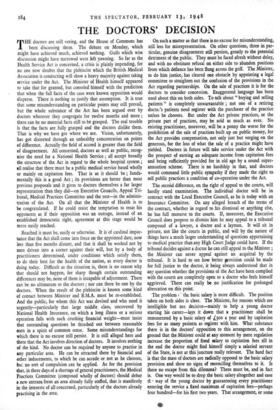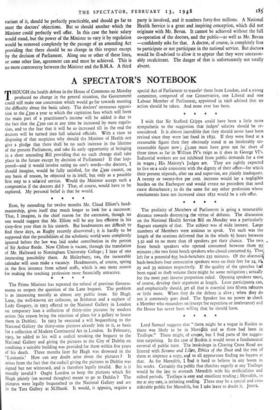THE DOCTORS' DECISION
THE doctors are still voting, and the House of Commons has been discussing them. The debate on Monday, which might have achieved much, achieved nothing. Gulfs which wise discussion might have narrowed were left yawning. So far as the Health Service Act is concerned, a crisis is plainly impending, for no one now doubts that the plebiscite which the British Medical Association is conducting will show a heavy majority against taking service under the Act. The Minister of Health himself appeared to take that for granted, but consoled himself with the prediction that when the full facts of the case were known opposition would disperse. There is nothing to justify that assumption. It is true that some misunderstanding on particular points may still prevail, but the whole substance of the Act has been argued over by doctors wherever they congregate for twelve months and more ; there can be no material facts still to be grasped. The real trouble is that the facts are fully grasped and the doctors dislike them. That is why we have got where we are. Vision, unfortunately, has got distorted through an unhealthy concentration on points of difference. Actually the field of accord is greater than the field of disagreement. All concerned, doctors as well as public, recog- nise the need for a National Health Service ; all accept broadly the structure of the Act in regard to the whole hospital system ; all realise that there must be a public medical service based wholly or mainly on capitation fees. That is as it should be ; funda- mentally this is a good Act ; its provisions are better than most previous proposals and it gives to doctors themselves a far larger representation than they did—on Executive Councils, Appeal Tri- bunal, Medical Practices Committee and the rest—in the adminis- tration of the Act. On all that the Minister of Health is to be congratulated. If he could resist the temptation to treat his opponents as if their opposition was an outrage, instead of an established democratic right, agreement at this stage would be more easily reached.
Reached it must be, easily or otherwise. It is of cardinal impor- tance that the Act shall come into force on the appointed date, now less than five months distant, and that it shall be worked not by men driven into a corner against their will, but by a body of practitioners determined, under conditions which satisfy them, to do their best for the health of the nation, as every doctor is doing today. Difficult as the situation is, there is no reason why that should not happen, for sharp though certain outstanding differences may be, none of them is incapable of adjustment. There can be no ultimatum to the doctors ; nor can there be one by the doctors. When the result of the plebiscite is known some kind of contact between Minister and B.M.A. must be re-established. And the public, for whom this Act was devised and who need it urgently—particularly that large middle. class, uncovered by National Health Insurance, on which a long illness or a serious operation falls with such crushing financial weight—must insist that outstanding questions be thrashed out between reasonable men in a spirit of common sense. Some misunderstandings for which there is no excuse still persist. It is still alleged here and there that the Act involves direction of doctors. It involves nothing of the kind. No doctor can be required by anyone to practise in any particular area. He can be attracted there by financial and other inducements, to which he can accede or not as he chooses, bit: no sort of compulsion can be applied. As for the provision that, in these days of a shortage of general practitioners, the Medical Practices Committee (composed wholly of doctors) should debar a new entrant from an area already fully staffed, that is manifestly in the interests of all concerned, particularly of the doctors already practising in the area. On such a matter as that there is no excuse for misunderstanding, still less for misrepresentation. On other questions, three in par- ticular, genuine disagreement still persists, greatly to the potential detriment of the public. They must be faced afresh without delay, and with no obstinate refusal on either side to abandon positions from which defiance has been flung across the gulf. The Minister, to do him justice, has cleared one obstacle by appointing a legal committee to straighten out the confusion of the provisions in the Act regarding partnerships. On the sale of practices it is for the doctors to consider concession. Exaggerated language has been used about this on both sides. To talk about "buying and selling patients" is completely unwarrantable ; not one of a retiring doctes patients need register with the purchaser of the practice unless he chooses. But under the Act private practices, or the private part of practices, may be sold as much as ever. No existing practitioner, moreover, will be a penny the worse for the prohibition of the sale of practices built up on public money, for the Act provides compensation, not only just but verging on the generous, for the loss of what the sale of a practice might have yielded. Doctors in future will take service under the Act with the prospect of earning an adequate income from capitation fees and being sufficiently provided for in old age by a sound super- annuation scheme. There is no hardship in that, and doctors would command little public sympathy if they made the right to sell public practices a condition of co-operation under the Act.
The second difference, on the right of appeal to the courts, will hardly stand examination. The individual doctor will be in contract with the Local Executive Council, as he is today with an Insurance Committee. On any alleged breach of the terms of the contract, whether in regard to his dismissal or anything else, he has full recourse to the courts. If, moreover, the Executive Council does propose to dismiss him he may appeal to a tribunal composed of a lawyer, a doctor and a layman. It will sit in private, not like the courts in public, and will by the nature of things have a much larger understanding of questions appertaining to medical practice than any High Court Judge could have. If the tribunal decides against a doctor he can still appeal to the Minister ; the Minister can never appeal against an acquittal by the tribunal. It is hard to see how better provision could be made for full justice to the doctor, it being always understood that in any question whether the provisions of the Act have been complied with the courts are completely open to a doctor who feels himself aggrieved. There can really be no justification for prolonged altercation on this point.
The problem ( the basic salary is more difficult. The position taken on both sides is clear. The Minister, for reasons which are intelligible but not decisive—mainly to help a young doctor starting his career—lays it down that a practitioner shall be remunerated by a basic salary of £300 a year and by capitation fees for as many patients as register with him. What substance there is in the doctors' opposition to this arrangement, on the ground that the Minister could at any moment by mere regulation increase the proportion of fixed saLary to capitation fees till in the end the doctor might find himself simply a salaried servant of the State, is not at this juncture really relevant. The hard fact is that the mass of doctors are radically opposed to the basic salary provision and show no signs of reconciling themselves to it. Is there no escape from this dilemma? There must be, and in fact is. One way would be to drop the basic salary altogether and ease th way of the young doctor by guaranteeing every practitioner entering the service a fixed maximum of capitation fees—perhaps four hundred—for his first two years. That arrangement, or some variant of it, should be perfectly practicable, and should go far to meet the doctors' objections. But so should another which the Minister could perfectly well offer. In this case the basic salary would stand, but the power of the Minister to vary it by regulation would be removed completely by the passage of an amending Act providing that there should be no change in this respect except by the decision of Parliament. Along one or other of these lines, or some other line, agreement can and must be achieved. This is no mere controversy between the Minister and the B.M.A. A third party is involved, and it numbers forty-five millions. A National Health Service is a great and inspiring conception, which did not originate with Mr. Bevan. It cannot be achieved without the full co-operation of the doctors, and the public—as well as Mr. Bevan —confidently asks for that. A doctor, of course, is completely free to participate or not participate in the national service. But doctors would be ill-advised to allow it to appear that they were unreason- ably recalcitrant. The danger of that is unfortunately not totally absent.



































 Previous page
Previous page